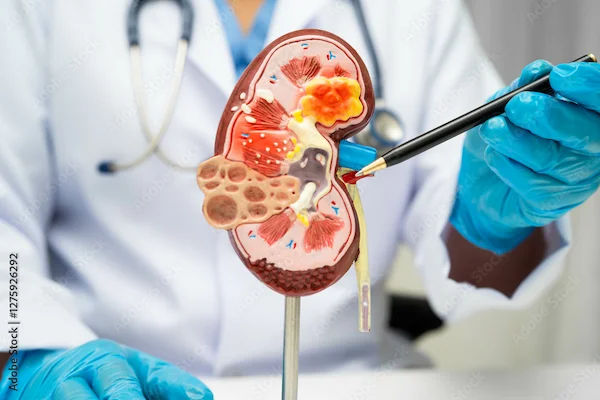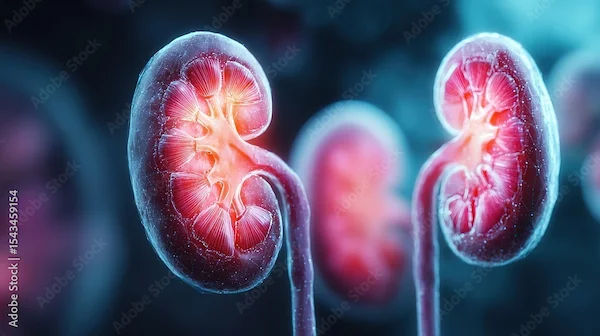Side Effects After Kidney Transplant
Learn about the potential side effects after a kidney transplant, including short-term and long-term complications. Understand how to manage risks and support your recovery effectively.

Written by
Last updated on 17th Jul, 2025

Introduction
A kidney transplant is a life-changing procedure that offers hope and a better quality of life for people with end-stage kidney disease. However, like any major surgery, it comes with potential side effects and challenges. If you or a loved one has undergone a kidney transplant, it’s important to be aware of these side effects and know how to manage them effectively. This article will help you understand common side effects after a kidney transplant, why they happen, how to manage them and when to seek medical help.
Common Side Effects After a Kidney Transplant
Some of the common side effects after a kidney transplant are:
1. Side Effects from Immunosuppressant Medications: After a kidney transplant, your body may try to reject the new kidney because it recognizes it as foreign. To prevent this, doctors prescribe immunosuppressant (anti-rejection) drugs. While these medications are essential, they can cause side effects, including:
Increased risk of infections (since your immune system is weakened)
Weight gain (due to fluid retention or increased appetite)
High blood pressure
High cholesterol and blood sugar levels (may lead to diabetes)
Tremors or shaking hands
Mood swings or anxiety
Bone thinning (osteoporosis)
How to Manage These Side Effects:
Take medications exactly as prescribed.
Maintain a healthy diet (low in salt, sugar, and unhealthy fats).
Exercise regularly (with your doctor’s approval).
Monitor blood pressure and sugar levels frequently.
Stay up-to-date with vaccinations (avoid live vaccines unless approved by your doctor).
2. Infections: Because immunosuppressants weaken your immune system, you become more prone to infections. Common infections after a transplant include:
Urinary tract infections (UTIs)
Respiratory infections (like colds, flu, or pneumonia)
Skin infections
Fungal infections (such as oral thrush)
How to Reduce Infection Risks:
Wash hands frequently.
Avoid crowded places initially after surgery.
Stay away from people who are sick.
Keep wounds clean and dry.
Report any signs of infection (fever, cough, pain, unusual discharge) to your doctor immediately.
3. Kidney Rejection: Even with immunosuppressants, your body may still try to reject the new kidney. There are two types of rejection:
Acute rejection (happens suddenly, often within the first few months)
Chronic rejection (develops slowly over years)
Signs of Rejection:
Decreased urine output
Swelling in hands, feet, or face
Fever or fatigue
Pain or tenderness near the transplant site
High blood pressure
If you notice any of these symptoms, contact your transplant team immediately. Early detection can help prevent permanent damage.
Consult Top Nephrologists
4. Digestive Problems
Immunosuppressants and other medications can cause:
Nausea or vomiting
Diarrhoea or constipation
Stomach pain or acid reflux
How to Manage Digestive Issues:
Eat small, frequent meals.
Avoid spicy, greasy, or heavy foods.
Stay hydrated.
Take medications with food if they upset your stomach (ask your doctor first).
5. Skin and Hair Changes
Some transplant medications can lead to:
Acne or skin rashes
Thinning hair or excessive hair growth in unusual places
Increased sensitivity to sunlight (higher risk of sunburn)
How to Care for Your Skin and Hair:
Use gentle skincare products.
Wear sunscreen (SPF 30 or higher) when outdoors.
Avoid tanning beds.
If hair loss is severe, talk to your doctor about possible adjustments in medication.
6. Emotional and Mental Health Changes
A kidney transplant is a major life event, and it’s normal to experience:
Anxiety or depression
Mood swings
Stress about medication schedules and follow-ups
How to Support Your Mental Health:
Talk to a counsellor or join a support group for transplant patients.
Practise relaxation techniques (meditation, deep breathing).
Stay connected with family and friends.
Don’t hesitate to ask for help when needed.
Lifestyle Tips for a Healthy Recovery
Some of the lifestyle tips for a healthy recovery after the transplant are:
1. Follow a Kidney-Friendly Diet
Limit salt to control blood pressure.
Reduce sugar to prevent diabetes.
Eat lean proteins (chicken, fish, eggs).
Avoid grapefruit (it interferes with some medications).
2. Stay Active (But Don’t Overdo It)
Start with light walking and gradually increase activity.
Avoid heavy lifting until your doctor approves.
3. Take Medications on Time
Missing doses can increase rejection risk.
Set reminders if needed.
4. Regular Check-Ups Are a Must
Blood tests and doctor visits help monitor kidney function.
5. Avoid Smoking and Alcohol
Both can harm your new kidney and interfere with medications.
When to Seek Emergency Help?
Call your doctor immediately if you experience:
High fever (above 101°F or 38°C)
Severe pain near the transplant site
Sudden swelling or shortness of breath
Little or no urine output
Uncontrolled vomiting or diarrhea
Conclusion
A kidney transplant is a gift of life, but it requires careful management. By staying informed, taking medications as prescribed, and following a healthy lifestyle, you can minimize side effects and enjoy a better quality of life.
Consult Top Nephrologist
Consult Top Nephrologists

Dr. Manju Kamal
Nephrologist
12 Years • MBBS,MD(General Medicine), DNB,DM(Nephrology)
Angamaly
Apollo Hospitals Karukutty, Angamaly

Dr Vinay Kumar A V
Nephrologist
8 Years • MBBS, MD - General Medicine, DM - Nephrology
Bilaspur
Apollo Hospitals Seepat Road, Bilaspur

Dr. Pranab Kumar Medhi
Nephrologist
20 Years • MBBS, MD(Medicine), IDCCM(Critical Care Medicine), DM(Nephrology)
Guwahati
Apollo Hospitals G S Road, Guwahati

Dr. Satyanarayana Garre
Nephrologist
6 Years • MBBS,MD,DNB Nephrology
Hyderabad
Apollo Hospitals Jubilee Hills, Hyderabad
(25+ Patients)

Dr Srivatsa A
Nephrologist
5 Years • MBBS, Doctor of Medicine (M.D.) - General Medicine ,Doctorate of Medicine (D.M.) - Nephrology , AST Fellowship in Kidney Transplant - Transplant Nephrology (Canada)
Bengaluru
Apollo Hospitals Bannerghatta Road, Bengaluru
Consult Top Nephrologist

Dr. Manju Kamal
Nephrologist
12 Years • MBBS,MD(General Medicine), DNB,DM(Nephrology)
Angamaly
Apollo Hospitals Karukutty, Angamaly

Dr Vinay Kumar A V
Nephrologist
8 Years • MBBS, MD - General Medicine, DM - Nephrology
Bilaspur
Apollo Hospitals Seepat Road, Bilaspur

Dr. Pranab Kumar Medhi
Nephrologist
20 Years • MBBS, MD(Medicine), IDCCM(Critical Care Medicine), DM(Nephrology)
Guwahati
Apollo Hospitals G S Road, Guwahati

Dr. Satyanarayana Garre
Nephrologist
6 Years • MBBS,MD,DNB Nephrology
Hyderabad
Apollo Hospitals Jubilee Hills, Hyderabad
(25+ Patients)

Dr Srivatsa A
Nephrologist
5 Years • MBBS, Doctor of Medicine (M.D.) - General Medicine ,Doctorate of Medicine (D.M.) - Nephrology , AST Fellowship in Kidney Transplant - Transplant Nephrology (Canada)
Bengaluru
Apollo Hospitals Bannerghatta Road, Bengaluru

_3.webp)


_5.webp)